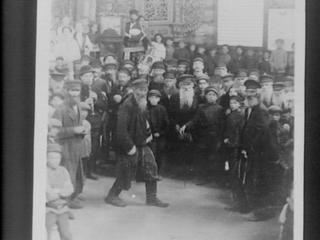Saturday July 19

Another empty day
I dared not even enjoy
at The Country mens affair
when a Torah was presented
to the Sniatyner Synagogue
The thought of my beloved
father (olam haba) kept me away
I went there but soon
left as I could not stand
the merriment.
-----------------
What a difference a death makes. The last time Papa went to a "Country mens" affair (by this he means an event for people from his home town of Sniatyn, a.k.a. his "countrymen," or landsmen in Yiddish) he described it as a "dream," and he stayed up and wrote about it until four in the morning to hold onto the heady, happy buzz it gave him. And that was merely an annual dance; the presentation of a new Torah to his congregation should have been an even more intoxicating convergence of spiritual joy and fortifying thoughts of the old country.
Sadly, in the same way that, on the previous day, the prospect of earning more money only made him more conscious of his debts, the celebration at the Sniatyner synagogue reminded him, in yet another new and cruel way, that his dreams of home, of one day reuniting with his family, of somehow recapturing the "lost paradise" of his youth, died with his father back in May. His fellow congregants probably danced in the halls of the schul and poured out onto East Broadway, singing Hebrew songs and crowding together as they did on Simchas Torah, just like they did in the old country. But Papa suspected the ritual would unsettle him, and like many such prophesies his was self-fulfilling. The Torah, a symbol of renewal and progress and hope, symbolized for Papa only the loss of his father, who had been a Torah scholar and teacher. The cheerful crush of his thronging landsmen, who celebrated not just a new Torah but their own freedom to demonstrate their faith on the streets of their adopted country, made Papa feel like he was at the center of a storm, brought home only the isolation he felt in New York, the trouble his mother and brother and sisters were in back in Europe.
His fellow congregants probably danced in the halls of the schul and poured out onto East Broadway, singing Hebrew songs and crowding together as they did on Simchas Torah, just like they did in the old country. But Papa suspected the ritual would unsettle him, and like many such prophesies his was self-fulfilling. The Torah, a symbol of renewal and progress and hope, symbolized for Papa only the loss of his father, who had been a Torah scholar and teacher. The cheerful crush of his thronging landsmen, who celebrated not just a new Torah but their own freedom to demonstrate their faith on the streets of their adopted country, made Papa feel like he was at the center of a storm, brought home only the isolation he felt in New York, the trouble his mother and brother and sisters were in back in Europe.
Would he have felt guilty to share in the deep satisfaction he should have felt on this day? Did he feel like he didn't have the right to be happy if his father was dead? Is that why he said he "dared not even enjoy" the presentation of the Torah? And what did he do when he left the synagogue? Did he wander around through Chinatown or up through the Lower East Side? Did he head back to his apartment to listen to the radio and pore over his photos from home? Did he take grim satisfaction in his detachment or did it strike him, in some small way, that the past was past, that Sniatyn no longer belonged to him, that his only chance at happiness was to build, at last, a brand new life for himself?
-----------------
References
1 - As previously noted, the Congregation Sniatyner Agudath Achim gathered at a multi-use facility called Broadway Manor at 209 East Broadway between Clinton and Jefferson Streets. It's now the location of the Primitive Christian Church.
Image Source: Image source: "Portrait of a 'siyum ha-toyre' (completion of the writing of a Torah scroll)." Courtesy of the Yivo Institue for Jewish Research's People of a Thousand Towns site.





No comments:
Post a Comment